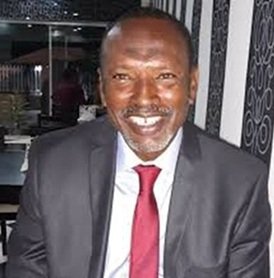By Abdullahi A. Nor
There are few names in the Horn of Africa that still echo like war drums in the minds of many. Among them, Qalbi-Dhagax—whose name literally translates to Heart-of-Stone—is not just a nickname; it’s a metaphor, a political compass, and depending on who you ask, either the last standing revolutionary or a headache to Ethiopian bureaucrats.
Today, April 10, 2025, the man himself staged an official comeback, elected as Chairman of the Ogaden National Liberation Front (ONLF) by the group’s Central Council, replacing Abdirahman Sheikh Mahdi. The outgoing chairman, was unseated amid allegations of internal rule violations, , endangerment of party cohesion and interference in decision-making. In his place, Qalbi-Dhagax—longtime deputy and former freedom fighter—has been elected to lead the organization into its next chapter.
A Chair Too Hot to Sit On
The ONLF’s chairmanship is not your average desk job. It requires a strong jawline for photo ops, steel nerves for regional diplomacy, and apparently, the patience of a monk when dealing with Jigjiga’s labyrinthine politics.
Qalbi-Dhagax—who once spent his days dodging bullets and chewing khat in the trenches of resistance—now returns not just with hardened resolve but with something more lethal: public sympathy.
Let’s not forget, this is the same man who was extradited by the Somali Federal Government in 2017, in a move that shocked the Somali public and made many wonder if Mogadishu’s leadership had confused national heroes with hand luggage.
“That handover was like giving away the flag,” says Deeqo Ahmed, a civil society activist in Beledweyne. “You don’t hand over a man like Qalbi-Dhagax and expect the people to forget. Even camels in the countryside remember!”
The man who orchestrated the handover, then-NISA chief Abdullahi “Sanbalooshe”, now resides in the Hall of Infamy for political betrayal—where seats are limited, but always available for those who cross certain red lines.
“Sanbalooshe’s advice to hand over Qalbi-Dhagax is one of the worst decisions in Somali intelligence history,” says Mohamed Noor, a political analyst. “It would be like the British handing over Churchill to the Nazis because he was too loud in meetings.”
The Other Half of the Story: President Mustafa Cagjar
But let’s not ignore the other man in the room—the bespectacled reformist and current Somali Regional State President, Mustafa Muhumed Omar (Cagjar). While Qalbi-Dhagax is busy stirring the soul of the resistance, Cagjar has been paving roads and sending kids to school.
Love him or hate him, the man did show up with spreadsheets and a vision when the region was still shaking from decades of paranoia. And while critics say his administration is slow to respond to political grievances, others point out that at least “he’s not building prisons anymore—he’s building water wells.”
“Mustafa brought stability. We now argue about politics on Facebook instead of whispering in tea shops,” jokes Ismail Barkhad, a university lecturer in Jigjiga. “That alone deserves applause and maybe a small goat.”
“Both Qalbi-Dhagax and Cagjar are fighting for the same people, just with different playlists,” adds Nasra Hussein, a youth leader in Godey. “One is shouting freedom songs from the 90s, the other is drafting budget lines on Excel. We need both.”
A Region on the Edge of Renewal or Ruin?
The leadership change within ONLF comes during heightened tension between the group and Cagjar’s administration. Yet many believe this is less a crisis and more a growing pain—a sign that the Somali Region is maturing politically.
“It’s like a marriage after 20 years,” says a local elder with a grin. “There’s shouting, sleeping on different mattresses, but deep down they still want to grow old together.”
With Qalbi-Dhagax now holding the reins of ONLF and President Cagjar still steering the Somali Region, the challenge lies in whether these two iconic figures will clash or converge. One represents the fire of past struggles, the other the torch of pragmatic governance.
In a region that has known war, betrayal, and the odd power outage during Zoom calls, the people hope that both men will remember one truth: peace is cheaper than pride, and roads are better built with handshakes than headlines.
For now, all eyes are on Jigjiga. And while no one knows how this will play out, one thing is certain: the stone-hearted revolutionary is back—and this time, he’s bringing both history and hope with him.
Abdullahi A. Nor
Email: abdulahinor231@gmail.com


Leave a Reply